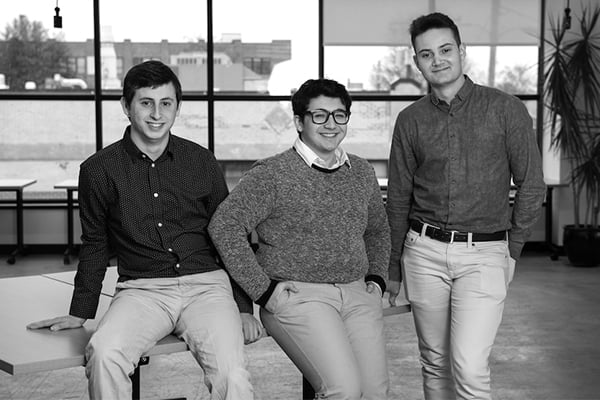The founders of Cellular Analysis Technologies valued their time in the FastForward U’s spring Accelerator program so much, they’re going through the program twice—first as a Spark team, and now as a Fuel team. The program helps students from across Johns Hopkins bring their business ideas to life.
Christian Gonzalez, a junior majoring in biomedical engineering, came up with the idea for CAT while working in a tissue culture lab at Johns Hopkins’ Institute for NanoBioTechnology during the summer of 2018. As a research assistant, much of his time was spent on the mundane task of counting cells by looking at photos of petri dishes. To Gonzalez, visually identifying cells felt like a time-consuming chore that could be done faster using data analysis software.
“I started searching for ways that I could improve it. I found some basic cell-counting algorithms online, but they weren’t really designed for the images I was working with,” he says.
He asked his friend Robert Waxman, a senior studying biomedical engineering and computer science, to help him invent a software solution during HopHacks, the university’s 36-hour biannual hackathon, but Waxman thought the idea could be something bigger.
“When I got to Hopkins, I knew I wanted to start something entrepreneurial, but I didn’t know what it was going to be,” says Waxman. Seeing a golden opportunity, he convinced Gonzalez to go into business with him, and CAT was born. A few months later, Marc Bordui, a senior studying chemical and biomolecular engineering, joined the team to help with marketing.
When they arrived for the Spark Accelerator in the fall of 2019, the group had little more than an idea and a bare-bones website. They were soon paired with an industry mentor and Nathan Buchbinder ’15 from Proscia, a successful Philadelphia-based company that works on digital pathology software. Like CAT, Proscia was also founded by undergrads in the Whiting School. Over the next nine weeks, the students learned the ins and outs of customer segmentation, identified where their product fits in the market, built their first prototype algorithm, and learned how to manage a team.
CAT was also one of two student companies to win a $5,000 Microsoft Student Acceleration Grant, made available through a partnership with FastForward U. Designed to support artificial intelligence and data science startups, the award included up to $120,000 in cloud computing credits and the opportunity to work with architects and developers at Microsoft.
The team believes its cell-counting software has the potential to save researchers hundreds of hours per year, but to prove it, the team needs to conduct more tests. During the spring semester, the students planned on starting a pilot project with five to 10 users and hope to get Johns Hopkins professors on board.
“The advantage of being at Hopkins is that the cancer researchers are the most famous in the field,” explains Waxman. “If we can convince them that this is a reliable tool to analyze their data, we can leverage that information to convince other researchers.”
He says CAT’s decision to participate in the Accelerator twice was less about gaining more business skills and more about community.
“When you’re in the Accelerator, you’re with all the other entrepreneurs on campus. You have a whole bunch of people rooting for you. Having that network is really important for us.”
– Lacey Ann Johnson

